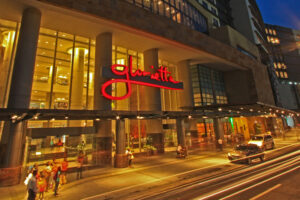AYALA MALLS is increasing the budget for its mall renovation program to include more properties, as the developer aims to add 700,000 square meters (sq.m.) of new gross leasable area (GLA) over the next five years.
Mariana Zobel de Ayala, Ayala Malls president and head of the leasing and hospitality group, said during a media event on Thursday that the mall renovation program now has a P17.5-billion budget, up from the previous P13 billion announced at its launch last year.
Ms. Zobel said renovations at Glorietta, Greenbelt, TriNoma, and Ayala Center Cebu are on track, with key milestones scheduled for completion in the coming months.
The redevelopment is part of Ayala Malls’ plan to add over 700,000 sq.m. of GLA in new locations over the next five years, including malls in areas such as the Parklinks joint estate development with Eton Properties Philippines, Inc. in Quezon City and Pasig.
“With the 700,000 sq.m., the plan is between three to five malls a year,” Ms. Zobel said.
“This extensive transformation is far more than just renovation; it’s about creating spaces where life happens, where memories are made — and one that aligns perfectly with Ayala Land’s long-term growth story of building places that people love,” she added.
Ayala Malls Chief Operating Officer Paul Birkett said planned mall openings include a mall within the Evo City Estate in Kawit, Cavite, as well as the expansion of Ayala Malls Solenad in Nuvali.
“We’re reimagining every aspect of the Ayala Malls experience with fresh eyes and renewed ambition. It’s not just about redesigning spaces; it’s about understanding how people want to live, move, and be inspired,” he said.
For the first quarter, Ayala Malls recorded a 4% increase in revenue to P5.7 billion, driven by stable occupancy and increased GLA at One Ayala and Ayala Malls Vermosa.
Excluding areas under renovation, flagship and premium malls posted 14% quarter-on-quarter growth, contributing to an 11% gain across the broader portfolio.
Ayala Malls said it remains confident in the strength of the Philippine retail market, citing resilient consumer demand, lower-than-expected inflation at 1.8% for the first half, and strong macroeconomic indicators. — Revin Mikhael D. Ochave
